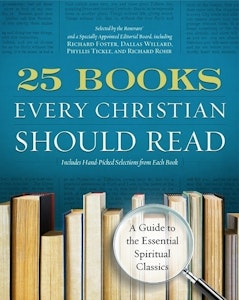 Excerpt from 25 Books Every Christian Should Read
Excerpt from 25 Books Every Christian Should Read
We all want to be better. Our thinking. Our acting. Our believing. But how do we really change?
Throughout the history of the Christian faith, Christians have been transformed by spiritual reading. Our primary resource is the Bible, but our life of faith has also been shaped by the writings of many Christians who were seeking to interpret the Bible, further their understanding, and live the Christian life. Such writings serve not only as lenses to reveal and clarify the biblical message but also as testimonies and guidance from Christians who have walked our path before us. We recognize that these authors have achieved Christlikeness in a way we would like to emulate, and, so, by reading their works, we, too, hope to be transformed in the ways these exemplars of the faith were transformed.
Foundations
The goal of spiritual reading is for it to affect who we are and what we do, to transform us. As Richard J. Foster writes in Celebration of Discipline, “Remember that the key to the Discipline of study is not reading many books, but experiencing what we do read.”
The most important book in the Christian devotional life is, of course, the Bible. Indeed, as Richard Foster writes in Life with God, “God has given us a written revelation of who God is and of what God’s purposes are for humanity. And God has chosen to accomplish this great work through the People of God on earth.
This written revelation now resides as a massive fact at the heart of human history. There is, simply, no book that is remotely close to achieving the significance and influence of the Bible. It is truly The Book (hay Biblos).”1 Time with the Bible, on our own and in our communities, is vital and well spent. No book can supplant its primary importance for us as Christians.
The Bible is the foundational work for the reading of all [great] books, just as the foundation of a building allows for the creativity and function of the building on top of it. [Classic books] represent a unique opportunity and challenge: the opportunity is that reading them can assist in the reformation of our hearts and minds into the likeness of Jesus Christ; the challenge is that reading for this purpose can be very different from the way we typically interact with written material. In short, here we are reading primarily for formation rather than for information.
Approach
Our society has trained us to extract data and knowledge from what we read. In contrast, what we hope to get out of reading these heart-oriented texts is wisdom and guidance from God. So we need to adjust our approach to the books and style of reading accordingly.
You may want to consider which book it would be good for you to read based on what you need at the time.2 Those seeking wisdom to chew on throughout the day might select The Sayings of the Desert Fathers. Those needing an affirmation of the love of God might try Revelations of Divine Love or The Return of the Prodigal Son.
So often we are inclined to blast through a book like we go through magazines or mystery novels…. It is much better for our souls if we give ourselves the permission to read and reread and read yet again the same paragraph that at any given moment is speaking to the heart within us. This slower pace of reading requires time. While a half hour is good, an hour or more is better, even if time cannot be set aside each and every day. Time allows one the opportunity to pore over and soak in the text, to chew and savor it.
Space is another consideration. Where will you do your spiritual reading? Know that the focus that spiritual reading requires is best achieved when we are comfortable and there are few competitors for our attention.
A time-tested way for slowing our reading and focusing our attention is to keep a journal on hand while reading for thoughts and reflections. Writing in the margins of the book and underlining words and phrases that resonate can also become a type of journal, a record of reading that will both mark time and bring benefit again when the book is referenced later.
We also recommend approaching the text in a nonjudgmental fashion. Often when reading older books or books in unfamiliar genres, we focus so much on the differences between our own outlook and that of the author that we close our minds to the wisdom found in this different perspective. We must consider the distance of time between when [the] books were written and our period. Many of these authors were also experiencing a much different style of living than our own, such as a religious community or cloistered order.
And there is the matter of our post-Enlightenment outlook; for instance, some of the authors of these books thought that the sun revolved around the earth! For whichever reason, to read these books for formation, we need to allow the stories and phrases that strike us as odd and peculiar to stand, at least initially. A good strategy might be to try to suspend judgment and simply allow the author to teach whatever it is she or he has to teach even if at times it seems unrealistic or strange. Remind your inner critic that the authors of many of these books were asking much different questions than we do, and that maybe we should be asking different questions ourselves.
The results of reading these books may be that (1) your vision of the kingdom of God becomes more and more acute, and it makes you long for the potential of it for yourself and your neighbors, and (2) you become depressed because this vision is so far away from your current reality…. Inevitably, as we read, we will be caught up into this vision as well, and we may feel discouraged as we see how our own lives fail to measure up to this ideal. Reading these books with others can help moderate such feelings of discouragement, and even add to the benefit of our study. But ultimately we are alone with our thoughts and will look to God as our solace. In so doing, we enter into the joy and sorrow of God over the life of the world and our role in it.
Adapted from the introduction to 25 Books Every Christian Should Read: A Guide to the Essential Spiritual Classics (A Renovare Resource), edited by Julia L. Roller.
Photo by César Viteri on Unsplash
Text First Published September 2011 · Last Featured on Renovare.org November 2022


